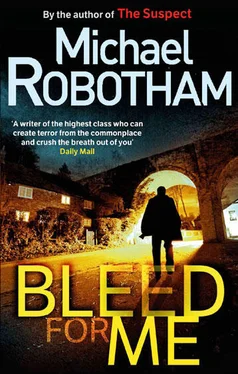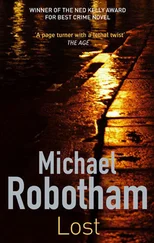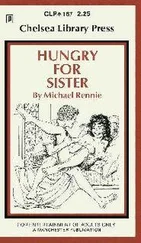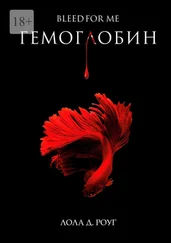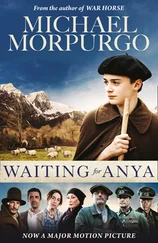Ruiz pushes open the sitting-room door. It’s dark inside. The blinds are drawn. ‘It’s only me, Coop, come round for a chat.’
The reply is thick with phlegm. ‘Ah’m nae in the mood.’
Mr Regan is sitting in an armchair, his tattooed forearms resting horizontally at his sides. I can’t see his face in the gloom, but a soiled singlet is stretched over his barrel-chest.
The flicker of a television throws shadows across the room. He’s watching old home movies. On screen, a young girl, barely three, is playing under a sprinkler, running in and out of the spray. The sound is turned down.
Mr Regan raises a glass to his lips. The dark fluid turns to amber as it passes in front of the light.
‘This is Joe O’Loughlin, he’s a friend of mine, Coop,’ says Ruiz. ‘He’s come to ask about Carolinda. Maybe he can help.’
‘He cannae bring her back, can he?’
‘No,’ I reply, feeling a strong impulse to turn and go back down the stairs, along the street, back to the car; as far away as possible.
Coop reaches for a bottle at his feet and refills his glass. His tattoos seem to move in the light from the television, becoming animated and telling stories of drunken nights, tattoo parlours and hangovers.
Ruiz takes a seat opposite him. ‘It’s early to be drinking.’
Coop doesn’t answer. I move further into the room and sit in an armchair beside the TV. Coop gazes past me at the screen, which reflects in his eyes.
‘I wanted to ask about Caro.’
‘Ah’m listening.’
‘What was she like?’
Coop takes a ragged breath and seems to hold it inside.
‘Ah wanted a wee lad,’ he says finally. ‘Ah was sure Caro were going to be a boy. Came as a shock when she came out. Thought something had gone wrong. “It’s a bonnie lass,” Ah said, and Philippa she says, “Are you sure, Coop?” Ah looked again just to be certain.’
The home movie has changed and Caro is singing into a pretend microphone, wearing one of her mother’s dresses, which keeps slipping off her shoulders.
‘Ah watched her grow,’ says Coop. ‘Ah counted her smiles, her steps. She were ten months old when she took her first steps from this chair to that one where you’re sitting. She were always in a hurry. Ah couldn’t get her to slow down. Even when she married, Caro did everything in a hurry. Didn’t like her choice, never trusted him, but Caro loved him. Ah paid for the wedding. Rented a posh place for the reception. Walked her up the aisle. She were a bonnie bride.’
Coop looks at me, questioning. ‘It was mah wee girl’s wedding, but Gordon shoved us away in a corner, treated us like dirt because we weren’t rich or well connected.’
‘When was that?’
‘Seven years ago now,’ replies Coop. ‘Caro weren’t the same girl after that. Gordon did something to her.’
‘What did he do?’
He shrugs. ‘Ah cannae say for certain, but he took away her smile.’
He turns his glass slowly in his hand.
‘When a bairn loses both parents they become an orphan, but they don’t have a name for parents who lose a child.’
‘No.’
‘Sometimes Ah pray. Ah’m not very good at it. Ah pray that he didn’t leave her body somewhere cold. Ah pray Caro’s in Heaven, which is somewhere she believed in. Cannae say that Ah do.’
The TV screen flickers and new images appear. Caro, aged about ten, riding on a Ferris wheel. Every time it circles close to the ground she waves at the camera, holding her dress between her knees to stop it blowing up.
‘What’s your name?’ asks Coop.
‘Joe.’
‘Ever wondered, Joe, whether the pain of losing a child is equal to the happiness of becoming a father?’
He doesn’t wait for an answer.
‘There’s nae fucking comparison. Becoming a father is about that first step, that first smile, that first word, that first time she rides a bike or climbs a tree or goes to school, her first dance, her first date, her first kiss. You add all those moments together - every birthday, Christmas, every dream - and there’s nae fucking comparison.
‘When you have a child you think your life means something, you know. It’s not like you’ve cured cancer or captained Scotland, but you’ve had a kid. You’ve left something behind.’
His voice has begun to shake and his chest heaves. He bites down hard on his fist.
‘You want to know the worst thing?’ he says, struggling to get the words out. ‘Ah’m angry with her, with Caro. Ah want to scold her, ground her, send her to her room. Ah want to tell her she cannae go out. Ah want to stop her growing up, leaving home, getting married.
‘Ah’m angry because she took over our lives - our day began and ended with hers - we planned her schooling, her holidays, her future. What future? For all that love and pain, this is what we get! What’s the fucking point?’
‘You’ll think differently one day, Coop.’
‘What should Ah be thinking?’
‘About your wife out there in the kitchen.’
He nods, looking chastened.
‘Ah used to feel guilty about loving Philippa less after Caro were born.’
‘You loved them both.’
He nods. The image changes again. Caro is grown up, sitting up in a hospital bed, cradling a newborn baby. Hair is plastered to her forehead, but she’s smiling through her tiredness.
‘That’s our lad, Billy,’ says Coop, motioning to the screen. ‘We don’t get tae see him any more. Gordon will nae bring him home and he won’t let us take Billy for a holiday. We’re his grandparents. He shouldn’t be allowed to keep him from us.’
‘How old was Billy when Caro disappeared?’
‘Almost two. Caro dropped round to see us the day before Billy’s birthday. She had to sneak over because Gordon didn’t like her coming round here.’
‘Why?’
Coop shrugs. ‘Ah think he wanted to control her.’
‘Did she tell you that?’
‘Ah could see it.
‘When Caro disappeared, what happened?’
‘Gordon said she just up and left him. Walked out. He told the police that Caro had a lover, but that were a lie.’
Coop’s whole body jerks and the Scotch spills over his fingertips. He licks the liquid from his hand and wrist.
‘Did the police interview Gordon?’
‘Aye.’
‘Do you know the name of the officer in charge?’
‘Frank Casey. He’s retired now.’
The TV screen flickers and new images appear. Caro, aged about thirteen, is riding a pony that seems impossibly large, cantering between jumps, and she waves as she passes the camera. Coop’s whole body rocks forward as she approaches each jump, as if he’s riding with her.
It’s the emptiness inside him that’s the hardest. The voice he’ll never hear again. I have almost lost a child. I have almost lost a wife. I can imagine it. I can remember each moment with a clarity that overwhelms the senses. Words get trapped in my windpipe. Sweat prickles. Guts twist.
People who lose children have their hearts warped into weird shapes. Some try to deny it has happened. Some pretend it hasn’t. Losing friends or parents is not the same. To lose a child is beyond comprehension. It defies biology. It contradicts the natural order of history and genealogy. It derails common sense. It violates time. It creates a huge, black, bottomless hole that swallows all hope.
We leave the flat. Ruiz walks ahead of me, fists bunched, as though wanting to hurt somebody. I’m still thinking about what Coop said about life leading somewhere or meaning something. Mine doesn’t. I am living in a kind of limbo, a lull in proceedings. I am waiting for my wife to have me back - when I should be seizing every day and living it like it could be my last.
I’m like a guy stranded in a traffic jam, who wonders what the hold-up is and whether anyone is hurt and if I’ll make it home in time to watch I’m a Celebrity, Get Me Out of Here .
Читать дальше
